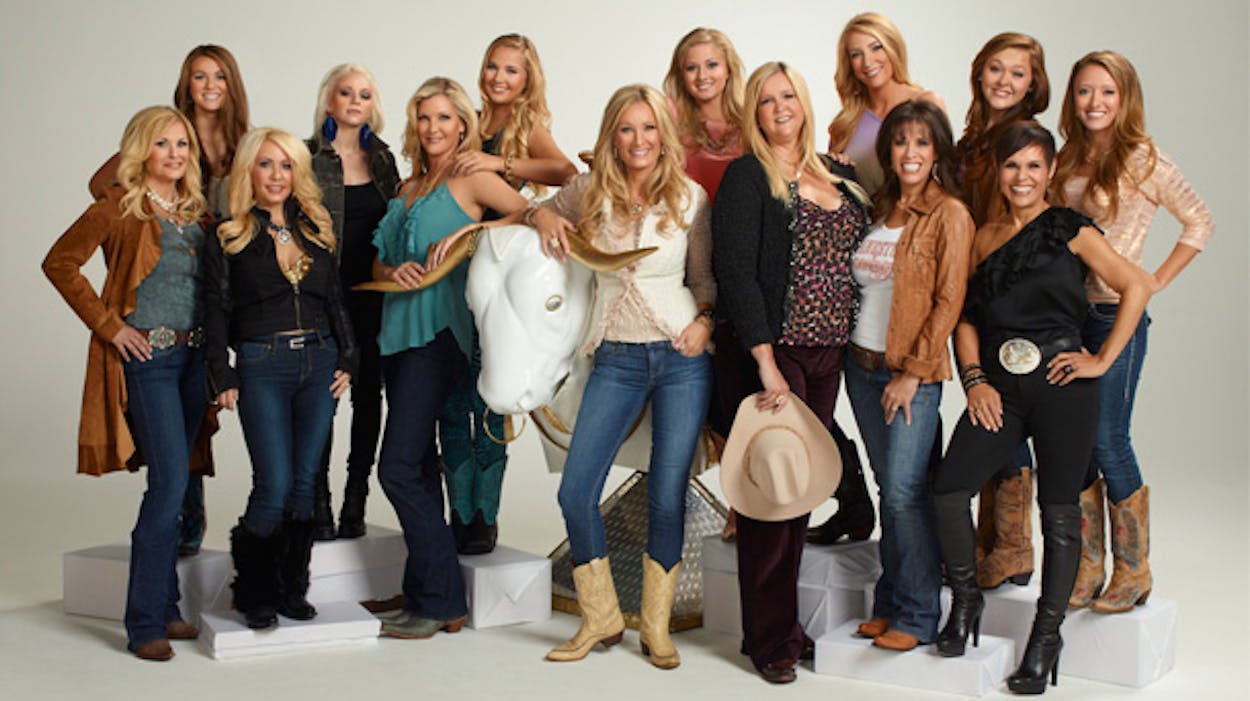In a cosmetic surgeon’s office in Dallas’s Uptown neighborhood, a mother sits in on a consultation with her sixteen-year-old daughter. Her explanation for their visit sounds like some nightmarish outtake from a remake of Mommie Dearest.
“She has these railroad tracks on her forehead that I think are unsightly,” she said, before adding: “She needs Botox.” Far from being traumatized, her daughter appears to be in complete agreement.
“Is there a law that says she can’t do this?” the mother asked the doctor.
The doctor said no, then, in an impressive pivot, noted: “There’s laws of nature.”
Welcome to the world of Big Rich Texas, a reality series on the Style Network that follows seven sets of mothers and daughters in the Dallas area, who are perhaps a bit too predictably obsessed with big hair, plastic surgery and the size of a lady’s engagement ring. (The third season finale aired last Sunday, though two reunion specials are scheduled for next month.)
Reconfigured out of the detritus of a failed reality series called Dallas Divas and Daughters, Big Rich Texas turned up in summer 2011, around the same time a number of other North Texas-set reality programs launched. Even by the low standards of such shows, reviews have been almost entirely withering. (The Dallas-based blogger Ed Bark wrote that “no one in the nation at large will see anything more than the usual paint-by-numbers portrait of a city that actually stands for a lot more than wretched excess in the name of naked greed.”)
But while other shows like Bravo’s Most Eligible: Dallas, CMT’s Texas Women, and Logo’s The A List: Dallas barely made a ripple in the popular culture, Big Rich Texas has seen steady ratings increases, and its cast members have emerged as minor celebrities. And the show boasts another unlikely triumph: Big Rich Dallas has spawned a franchise, with Big Rich Atlanta set to premiere in January.
“If Atlanta is a success, we’d love to dive right into another region quickly,” said Sarah Weidman, the network’s senior vice president for original programming and development. “You go into it hoping you can launch a franchise, but you don’t know if that will work out. “
Big Rich Texas took a somewhat circuitous path to air. According to Weidman, network executives were drawn to the idea of setting a reality show in Dallas, known for its brassy sense of style and larger-than-life personalities. The network liked the concept of mother-daughter pairings, but Dallas Divas and Daughters, which premiered in October 2009, never found an audience.
Not ready to give up on the idea, Style executives retained two of the cast members from Dallas Divas and Daughters—the sharp-tongued Pamela Martin-Duarte and her daughter, Hannah—and tweaked the premise: In Big Rich Texas, the mothers and daughters would all be members of the same exclusive country club. (The club, Woodhaven, is actually located in Fort Worth and doesn’t exactly register among North Texans as the most exclusive spot around.)
This time the formula worked, and Big Rich Texas was quickly renewed for a second and then third season. The show received an additional boost of “only-in-reality-TV-world” publicity last April, when Martin-Duarte filed a defamation lawsuit against her fellow cast members Bonnie Blossman and Dena Miller—who dropped out of the show after a few weeks of shooting—and the blogger Merritt Patterson, who had written critically about the show. (Martin-Duarte, who quit the show after the second season, has since dropped Patterson and Miller from the suit, but is still suing Blossman.)
The season three premiere of Big Rich Texas, in October, attracted 544,000 total viewers, a 29 percent increase over the season two premiere in February. Those numbers are not too far behind the network’s most popular show, Giuliana and Bill, which has averaged about 650,000 total viewers this season.
Why was this reality show a breakout when so many others that tried to capitalize on America’s ongoing cultural preoccupation with Dallas failed? Caitlin Adams, who blogs about Big Rich Texas for D Magazine, said that the show taps into America’s “everything-is-bigger-and-weirder” fascination with Texas.
But Adams also said that the women on Big Rich Texas are somehow relatable to a mainstream, recession-era viewer.
“A few of these ladies are divorced or living in apartments,” Adams said, “trying to live more glamorous lives than they actually have.”
The show has been criticized for wallowing in the worst sort of clichés about Texas women, but Weidman said that the characters do not perpetuate the myth.
“There is some of that sprinkled in, if they get dolled up for the night,” she said. “But we work very hard to find multi-dimensional women who aren’t just one thing. If they seem stereotypical, hopefully in the next episode, you’ll see another side of them that surprises you.”
Still, at least one of its cast members acknowledges that Big Rich Texas—like most reality programs—tends to maximize the negative, and leave the positive on the cutting room floor.
“They don’t show me and my daughter working with charities,” said Blossman, who appears on the show with Whitney, her 24-year-old daughter. “That is the bad part of being on a show like this—they’re not going to choose the positives of what you do and what you are. They’re obviously going to highlight the drama.”







